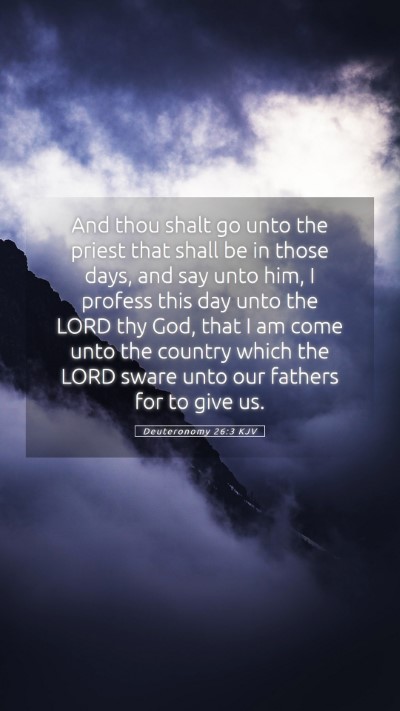Understanding Deuteronomy 26:3
Bible Verse: "And thou shalt go unto the priest that shall be in those days, and say unto him, I profess this day unto the Lord thy God, that I am come unto the country which the Lord sware unto our fathers for to give us." (Deuteronomy 26:3)
This verse marks a significant moment in the life of the Israelites as they prepare to enter the Promised Land. It serves as a reminder of God's promises and encourages acknowledgment of His faithfulness. Below, we explore the combined insights from respected public domain commentaries to enhance our understanding of this scripture.
Meaning and Significance
The essence of Deuteronomy 26:3 revolves around the act of declaration and recognition of God’s promises. It's a ceremony reflecting gratitude towards God for the land, representing His provision and fulfillment of promises made to the ancestors.
Insights from Commentaries
-
Matthew Henry: Henry emphasizes the solemnity of the acknowledgment that the Israelites must make to the priest upon entering their promised inheritance. It signifies their communal identity and covenant relationship with God. Such declarations serve to remind the people of their history, divine guidance, and their responsibilities as recipients of God’s grace.
-
Albert Barnes: Barnes notes that this practice of declaration serves both a liturgical and a civic purpose. By proclaiming their arrival, the Israelites are not just fulfilling a religious duty but also establishing their rights to the land. Barnes highlights the importance of recognizing the act of God in their accomplishments and transitions.
-
Adam Clarke: Clarke elaborates on the significance of the phrase ‘I profess this day’. He suggests it demonstrates both personal and communal accountability. The act of declaring before the priest is an exhibition of faith and an exercise in obedience, reaffirming their trust in God’s promises while fostering unity among the Israelites.
Key Themes
- Recognition of God's Promises: The verse showcases the act of reminding both the individual and the community of the covenant God established with their forefathers, providing a sense of continuity and hope as they enter the promised land.
- Gratitude and Responsibility: This scripture emphasizes that acknowledgment of divine blessings comes with the responsibility to adhere to God’s commandments and to maintain fidelity to His covenant.
- Role of the Priest: It illustrates the priest's role as a mediator between God and the people, highlighting the importance of communal worship and the priestly duties within Israelite religion.
Application to Daily Life
Understanding this verse can guide personal reflections on how one engages with God's blessings in their lives. Just as the Israelites were called to acknowledge God’s provision, individuals today are encouraged to reflect on and express gratitude for the blessings they experience. This acknowledgment can be verbal, through prayer, or through acts of service and obedience in their communities.
Cross References
- Exodus 3:8 - God's promise to deliver the Israelites from Egypt and bring them to a good and large land.
- Joshua 4:6-7 - The Israelites memorializing their crossing of the Jordan River as a testament to God’s faithfulness.
- Psalms 105:8-11 - God’s unwavering remembrance of His covenant forever.
Conclusion
Deuteronomy 26:3 serves as a powerful reminder of God’s faithfulness and the importance of acknowledging it within a community context. This verse encourages both personal and collective acknowledgment of God's blessings and draws attention to the responsibilities that come with being a part of God's covenant. Understanding Scripture like this enhances our Bible study insights and enriches our spiritual journeys.
For those seeking to deepen their understanding of Bible verses, such as the significance of Deuteronomy 26:3, engaging with online Bible study groups, utilizing Bible study tools, and exploring various Bible study resources can prove beneficial for richer insights and applications in everyday life.


